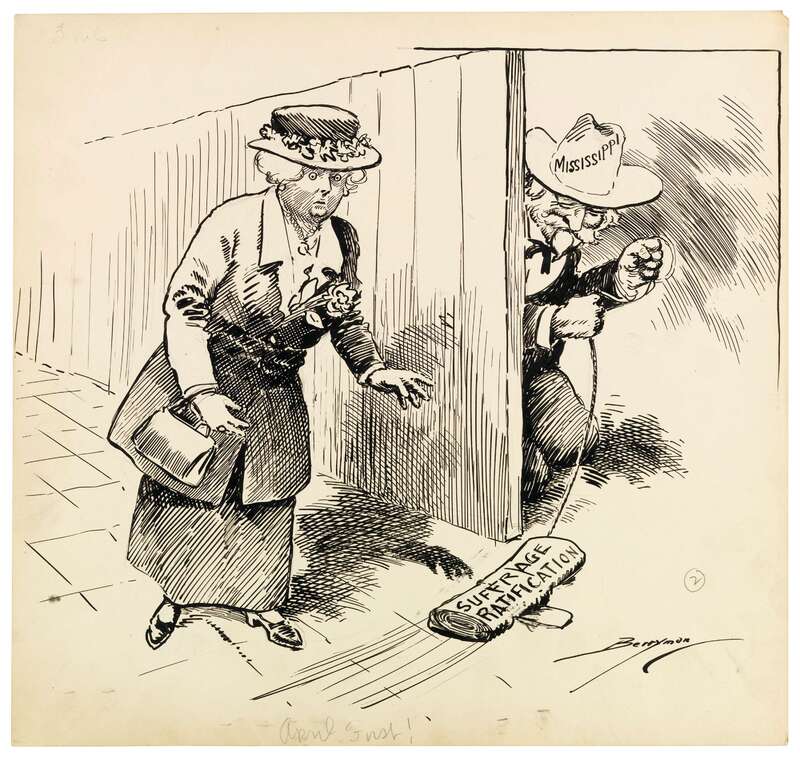April First
Initial efforts to secure the right to vote for women in the late 1800s and early 1900s achieved some success at the state level, but women's organizations finally concluded that an amendment to the U.S. Constitution was essential for woman suffrage.
World War I played an important role in helping women achieve the right to vote as many women began to work outside the home to support the war effort. In 1917 President Woodrow Wilson called for a Constitutional amendment; and, though the House passed a woman suffrage amendment in 1918, it failed in the Senate largely because of the opposition from southern states.
Finally on June 4, 1919, the 19th amendment passed both houses of Congress and was sent to the states for ratification. Many states quickly approved the 19th Amendment; and by the end of March 1920, only one additional state was needed for ratification. Mississippi could have been that state, but it rejected the amendment on March 29. In this image, political cartoonist Clifford Berryman portrays the Mississippi rejection as an April Fool’s joke on supporters for woman suffrage.
On August 13, 1920, however, Tennessee became the 36th state to approve the amendment. Two weeks later, on August 26, Secretary of State Bainbridge Colby signed the certification that the required number of states had ratified the Nineteenth Amendment. Mississippi eventually ratified it on March 22, 1984.
Clifford Berryman was one of Washington, DC's best-known cartoonists in the early to mid-1900s. Berryman drew for the Washington Post and Evening Star newspapers. His cartoons touched on a variety of subjects including politics, elections, and both World Wars.
World War I played an important role in helping women achieve the right to vote as many women began to work outside the home to support the war effort. In 1917 President Woodrow Wilson called for a Constitutional amendment; and, though the House passed a woman suffrage amendment in 1918, it failed in the Senate largely because of the opposition from southern states.
Finally on June 4, 1919, the 19th amendment passed both houses of Congress and was sent to the states for ratification. Many states quickly approved the 19th Amendment; and by the end of March 1920, only one additional state was needed for ratification. Mississippi could have been that state, but it rejected the amendment on March 29. In this image, political cartoonist Clifford Berryman portrays the Mississippi rejection as an April Fool’s joke on supporters for woman suffrage.
On August 13, 1920, however, Tennessee became the 36th state to approve the amendment. Two weeks later, on August 26, Secretary of State Bainbridge Colby signed the certification that the required number of states had ratified the Nineteenth Amendment. Mississippi eventually ratified it on March 22, 1984.
Clifford Berryman was one of Washington, DC's best-known cartoonists in the early to mid-1900s. Berryman drew for the Washington Post and Evening Star newspapers. His cartoons touched on a variety of subjects including politics, elections, and both World Wars.
source: https://www.docsteach.org/documents/document/april-first
